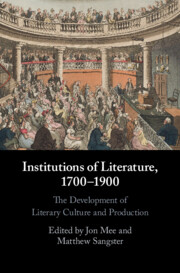Book contents
- Institutions of Literature, 1700–1900
- Institutions of Literature, 1700–1900
- Copyright page
- Contents
- Figures
- Contributors
- Acknowledgements
- Introduction Literature and Institutions
- Chapter 1 Knowledge Exchange in the Seventeenth Century
- Chapter 2 ‘Supporting Mutual Benevolence’
- Chapter 3 Institutions without Addresses
- Chapter 4 Eighteenth-Century Musenhof Courts as Bridges and Brokers for Cultural Networks and Social Reform
- Chapter 5 Becoming Institutional
- Chapter 6 Circulating Libraries as Institutional Creators of Genres
- Chapter 7 Lecturing Networks and Cultural Institutions, 1740–1830
- Chapter 8 Catalogues as Instituting Genres of the Nineteenth-Century Museum
- Chapter 9 Charles Lamb and the British Museum as an Institution of Literature
- Chapter 10 A Disruptive and Dangerous Education and the Wealth of the Nation
- Chapter 11 ‘The Ladies’ Contribution’
- Chapter 12 ‘[L]etters Must Increase’
- Chapter 13 Networks, Nodes, and Beacons
- Chapter 14 The Book as Medium
- Index
Chapter 3 - Institutions without Addresses
Published online by Cambridge University Press: 30 June 2022
- Institutions of Literature, 1700–1900
- Institutions of Literature, 1700–1900
- Copyright page
- Contents
- Figures
- Contributors
- Acknowledgements
- Introduction Literature and Institutions
- Chapter 1 Knowledge Exchange in the Seventeenth Century
- Chapter 2 ‘Supporting Mutual Benevolence’
- Chapter 3 Institutions without Addresses
- Chapter 4 Eighteenth-Century Musenhof Courts as Bridges and Brokers for Cultural Networks and Social Reform
- Chapter 5 Becoming Institutional
- Chapter 6 Circulating Libraries as Institutional Creators of Genres
- Chapter 7 Lecturing Networks and Cultural Institutions, 1740–1830
- Chapter 8 Catalogues as Instituting Genres of the Nineteenth-Century Museum
- Chapter 9 Charles Lamb and the British Museum as an Institution of Literature
- Chapter 10 A Disruptive and Dangerous Education and the Wealth of the Nation
- Chapter 11 ‘The Ladies’ Contribution’
- Chapter 12 ‘[L]etters Must Increase’
- Chapter 13 Networks, Nodes, and Beacons
- Chapter 14 The Book as Medium
- Index
Summary
This essay tests the definition of an institution as ‘an assemblage that organises, transmits, and validates’ something, ‘and that self-consciously represents itself as doing so’ that is offered in the introduction to this collection, particularly as it applies to large, diffuse institutions such as Authorship. I argue that much of the organization, transmission, and validation of authors that makes Authorship an institution is done by seemingly minor, but highly self-conscious microgenres, such as the sessions poem or the stylistic imitation. I then explore this idea by considering the phenomenon of Miltonic imitations, which detach John Milton’s manner from his exalted matter and antimonarchic politics in order to use it as a clever means of making familiar (and often highly unMiltonic) topics new. In so doing, they suggest that the essence of ‘Milton’ is somehow to be found in his style and so are, both individually and collectively, organizing, transmitting, and validating ‘him’. At the same time, these imitations are making the case that Authorship, as an institution, has the right and the duty to make such pronouncements about the essence of authors. Similar kinds of pronouncements were made through other microgenres, including the use of Milton’s ‘head’ as a shop sign for booksellers and scenes of Milton’s ghost interacting with other writers, both living and dead
Keywords
- Type
- Chapter
- Information
- Institutions of Literature, 1700–1900 , pp. 65 - 82Publisher: Cambridge University PressPrint publication year: 2022

